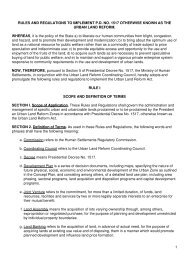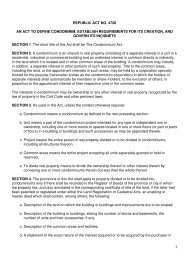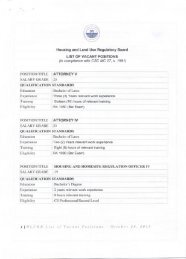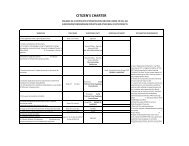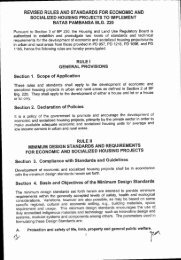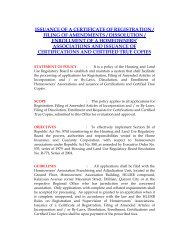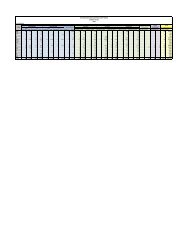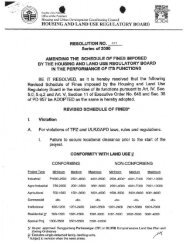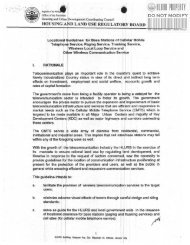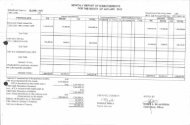2011 Revised Rules of Procedure - HLURB
2011 Revised Rules of Procedure - HLURB
2011 Revised Rules of Procedure - HLURB
Create successful ePaper yourself
Turn your PDF publications into a flip-book with our unique Google optimized e-Paper software.
HOUSING AND LAND USE REGULATORY BOARD<strong>2011</strong>REVISED RULES OF PROCEDUREOF THE HOUSING AND LAND USE REGULATORY BOARD
The <strong>2011</strong> REVISED RULES OF PROCEDURE OF THE HOUSING AND LANDUSE REGULATORY BOARD was published in the Official Gazette on July 11,<strong>2011</strong> and, accordingly, took effect on July 26, <strong>2011</strong>.
BOARD OF COMMISSIONERSRESOLUTION NO. 871Series <strong>of</strong> <strong>2011</strong>PROMULGATING THE <strong>2011</strong> REVISED RULES OF PROCEDURE OF THEHOUSING AND LAND USE REGULATORY BOARDPURSUANT TO Section 5 (c) and (j), Executive Order No. 648, Series <strong>of</strong> 1981,as amended by Executive Order No. 90, Series <strong>of</strong> 1986, and Executive OrderNo. 535, Series <strong>of</strong> 1979, as amended by Section 26 <strong>of</strong> Republic Act No. 8763,and Republic Act No. 9904, the Housing and Land Use Regulatory Board(<strong>HLURB</strong>) hereby adopts and promulgates the following <strong>Rules</strong> <strong>of</strong> <strong>Procedure</strong>.Part 1COMMON PROVISIONSRule 1TITLE AND CONSTRUCTIONSection 1. Title. - The following shall be known as the <strong>2011</strong> <strong>Revised</strong> <strong>Rules</strong> <strong>of</strong><strong>Procedure</strong> <strong>of</strong> the Housing and Land Use Regulatory Board, hereinafter referredto as the “<strong>Rules</strong>”.Section 2. Coverage. - This <strong>Rules</strong> shall be applicable to the following disputesor controversies:(a) Actions concerning unsound real estate business practices filed by buyers;(b) Claims involving refund and other claims filed by subdivision lot orcondominium unit buyer against the project owner, developer, dealer, brokeror salesman;(c) Cases involving specific performance <strong>of</strong> contractual and statutoryobligations filed by subdivision lot or condominium unit buyer against theproject owner, developer, dealer, broker or salesman;(d) Intra-association disputes or controversies arising out <strong>of</strong> the relationsbetween and among members <strong>of</strong> homeowners associations; between anyor all <strong>of</strong> them and the homeowners association <strong>of</strong> which they are members;(e) Inter-association disputes or controversies arising out <strong>of</strong> the relationsbetween and among two or more homeowners associations;1
(f)Disputes between such homeowners association and the state ins<strong>of</strong>ar asit concerns their individual franchise or right to exist and those which areintrinsically connected with the regulation <strong>of</strong> homeowners associations ordealing with the internal affairs <strong>of</strong> such entity;(g) Suits filed in opposition to an application for certificate <strong>of</strong> registration andlicense to sell, development permit for condominium projects, clearance tomortgage, or the revocation or cancellation there<strong>of</strong>, and locationalclearances, certifications or permits, when issued by the Regional FieldOffice <strong>of</strong> <strong>HLURB</strong>;(h) Appeals from decisions <strong>of</strong> local and regional planning and zoning bodies;and,(i)Other analogous cases.Section 3. Construction. - This <strong>Rules</strong> shall be liberally construed in order topromote the general welfare and to assist the parties in obtaining a just andspeedy determination <strong>of</strong> every action application or proceeding.Section 4. Nature <strong>of</strong> Proceedings. - Proceedings before <strong>HLURB</strong> shall besummary in nature. The provisions <strong>of</strong> the <strong>Rules</strong> <strong>of</strong> Court shall not be applicableexcept in a suppletory character.Rule 2ACTIONS AND PROCEEDINGSSection 5. Actions and Proceedings. - An action or proceedings means any suitfiled with <strong>HLURB</strong> by which one party sues another for the enforcement orprotection <strong>of</strong> a right or for the prevention or redress <strong>of</strong> a wrong.Section 6. Order <strong>of</strong> Proceedings. - The following proceedings shall be uniformfor all cases filed before the Arbiter:(a) The commencement <strong>of</strong> an action through the filing <strong>of</strong> a verified complaintand upon payment <strong>of</strong> the required legal fees;(b) Service <strong>of</strong> summons on the respondent, together with a copy <strong>of</strong> thecomplaint and all attachments thereto;(c) Filing <strong>of</strong> the answer;(d) Mandatory conference;2
(e) Optional submission <strong>of</strong> additional evidence; and,(f)Notice <strong>of</strong> the Decision.Section 7. Venue. - All complaints or actions shall be filed in the Regional FieldOffice which has jurisdiction over the area where the project involved is locatedor, in cases <strong>of</strong> homeowners suits, in the Regional Field Office where thehomeowners association is registered.Rule 3REAL PARTY IN INTEREST, COUNSELS AND REPRESENTATIVESSection 8. Parties. - Every action or proceeding must be prosecuted anddefended in the name <strong>of</strong> the real party in interest.All natural or juridical persons who claim an interest in the subject matter <strong>of</strong> theaction or proceeding and in obtaining the relief demanded shall be joined andreferred to as “complainants”.All natural or juridical persons who claim an interest in the controversy or in thesubject matter there<strong>of</strong> adverse to the complainant, or who are necessary to acomplete determination or settlement <strong>of</strong> the issues involved therein, shall bejoined and referred to as “respondents”.Section 9. Indigent Litigants. - The rule on the qualifications <strong>of</strong> indigent litigantsand their exemption from the payment <strong>of</strong> filing fees shall be in accordance withsuch rules as may be promulgated by the Supreme Court.Section 10. Derivative Suit. - A member <strong>of</strong> a homeowners association in goodstanding may bring an action on behalf <strong>of</strong> the association provided that:(a) The complainant was a member at the time the acts or transactionssubject <strong>of</strong> the action occurred and at the time the action was filed;(b) The complaint alleges with particularity that reasonable efforts wereexerted to exhaust all remedies available under the association's articles<strong>of</strong> incorporation, bylaws, laws or rules for the purpose <strong>of</strong> obtaining therelief prayed for; and,(c) The complaint states a valid cause <strong>of</strong> action.Section 11. Appearance <strong>of</strong> Counsel or Representative. - The appearance <strong>of</strong>counsel or representative is optional.3
(a) If a party is represented by counsel, the lawyer must indicate the followingin the pleadings:(1) Mailing address which is not a post <strong>of</strong>fice box number, including thelawyer's telephone/cellular phone number and email address, ifavailable;(2) Roll <strong>of</strong> Attorneys Number;(3) Current Pr<strong>of</strong>essional Tax Receipt Number, including the date andplace <strong>of</strong> issue;(4) IBP Official Receipt Number or IBP Lifetime Membership Number,including the date and place <strong>of</strong> issue; and,(5) Mandatory Continuing Legal Education Compliance or ExemptionCertificate Number and the date <strong>of</strong> issue.(b) A non-lawyer who represents a party shall attach to the pleading a specialpower <strong>of</strong> attorney authorizing such person to file the case and an affidavitduly executed by the party represented stating the reasons why suchperson was so authorized.(c) In case the real party-in-interest is out <strong>of</strong> the country, the special power <strong>of</strong>attorney must be authenticated by the consular <strong>of</strong>fice concerned andcomply with other applicable formalities for their execution.(d) In case the party represented is a corporation, the representative shallattach to the complaint, a board resolution authorizing such person to acton behalf <strong>of</strong> the corporation.Failure <strong>of</strong> the party to comply with the requirements herein shall render thepleading as not filed.Rule 4PLEADINGS, MOTIONS, AND PRACTICESection 12. Pleadings and Motions. - Pleadings and motions shall be filed intriplicate, plus such number <strong>of</strong> copies as there are respondents, with pro<strong>of</strong> <strong>of</strong>service to the other parties.Section 13. Pleadings Allowed. - Pleadings are either mandatory ordiscretionary.4
(a) Mandatory Pleadings. - Mandatory pleadings are those which areabsolutely necessary for the resolution <strong>of</strong> the case, such as, theComplaint, Answer, and Appeal Memorandum.(b) Discretionary Pleadings. - All other pleadings not prohibited may befiled. The filing <strong>of</strong> these pleadings does not toll the reglementary periods andfailure to file the same shall not have any adverse effect on the rights <strong>of</strong> theparties.Section 14. Prohibited Pleadings and Motions. - The following shall beconsidered as prohibited pleadings and motions which shall not be entertained:(a) Motion to dismiss;(b) Motion for a bill <strong>of</strong> particulars;(c) Petition for relief from judgment;(d) Motions for reconsideration in whatever stage <strong>of</strong> the proceedings;(e) Appeal from any interlocutory order, including but not limited to, cease anddesist orders;(f) Motions for extension <strong>of</strong> time;(g) Motions for postponement except for justifiable reasons;(h) Motion to admit pleadings filed beyond the reglementary period;(i)(j)Reply, except in answer to a compulsory counterclaim;Fourth and subsequent party complaints; and,(k) Motion for clarification <strong>of</strong> final orders and decisions.The filing <strong>of</strong> such pleadings or motions shall not interrupt the running <strong>of</strong> theprescriptive period and shall not bar the adjudication <strong>of</strong> the case.An opposition to a motion may be filed, without waiting for a separate ordertherefor, within five (5) days from the receipt <strong>of</strong> a copy <strong>of</strong> the motion.5
Rule 5COMPLAINTSection 15. Complaint. - The complaint shall contain the following:(a) Caption and Title. - In all cases filed before the Regional Field Offices, theparty initiating the action shall be called the “Complainant” and theopposing party the “Respondent”.(b) Body. - The body <strong>of</strong> the complaint shall contain the full name <strong>of</strong> the realparties in interest, whether natural or juridical, showing capacity to sue andto be sued, status, mailing address and designation, and a concisestatement <strong>of</strong> the ultimate facts which support the complainant's cause <strong>of</strong>action, claims or reliefs, and the date <strong>of</strong> preparation there<strong>of</strong>.(c) Relief. - The pleading shall specify the relief sought, but it may add ageneral prayer for such other relief as may be deemed just or equitable.(d) Signature. - The complaint must be signed and must contain therequirements under Rule 3 here<strong>of</strong>. The signature <strong>of</strong> counsel constitutes acertification that such counsel has read the complaint; that to the best <strong>of</strong>such counsel's knowledge and information, there is good ground tosupport it; and that it is not interposed for delay.(e) Verification. - A complaint is verified by an affidavit that the complainant hasread the complaint and that the allegations therein are true andcorrect <strong>of</strong> complainant's own personal knowledge. A complaint basedmerely on “information and belief” or upon “knowledge, information, andbelief” shall be dismissed.(f)Certification Against Forum Shopping. - The complainant shall certifyunder oath in the complaint or other initiatory pleadings asserting a claimfor relief, or in a sworn certification annexed thereto and simultaneouslyfiled therewith that:(1) The complainant has not theret<strong>of</strong>ore commenced any action or filedany claim involving the same issues in any court, tribunal or quasijudicialagency and, to the best <strong>of</strong> the complainant's knowledge, nosuch other action or claim is pending therein;(2) If there is such other pending action or claim, the complainant shallstate the status there<strong>of</strong>; and,(3) If the complainant should thereafter learn that the same or similar6
action or claim has been filed or is pending, the complainant shallreport that fact within five (5) days therefrom to <strong>HLURB</strong>.(g) The following shall be attached to the complaint upon filing:(1) Pro<strong>of</strong> <strong>of</strong> payment <strong>of</strong> filing fees;(2) Documentary evidence supporting the cause <strong>of</strong> action; and(3) In homeowners association cases, a certification issued by the chair <strong>of</strong>the Election Committee in cases involving elections, or by the chair <strong>of</strong>the Grievance Committee or any other committee constituted toresolve any matter in controversy at the association level, as the casemay be, stating under oath that the parties have been invited toparticipate in the proceedings to settle the dispute but that no amicablesettlement was reached.In the absence <strong>of</strong> an Election Committee and Grievance Committee or refusal toissue the certification, an affidavit attesting to this fact shall be made and furtherstating that complainant has exhausted administrative remedies.Non-compliance with any <strong>of</strong> the above requirements shall be a ground for thedismissal <strong>of</strong> the complaint without prejudice.If it is proved that the complainant has engaged in deliberate forum-shopping,the complaint shall be dismissed with prejudice.Section 16. Effects <strong>of</strong> Defective Signature, Verification and Certification <strong>of</strong> Non-Forum Shopping. -(a) Any defect in the signature or verification under paragraphs (d) and (e) <strong>of</strong>the preceding section shall not result in the dismissal <strong>of</strong> the complaint butshall be subject to correction during the mandatory conference. If thecomplainant refuses to rectify the error as directed by the Arbiter, theArbiter shall dismiss the case without prejudice.(b) Any defect <strong>of</strong> the certification against forum-shopping under paragraph (f)<strong>of</strong> the preceding section shall be a ground for the dismissal <strong>of</strong> thecomplaint, without prejudice.Section 17. Opposition to Application for a Permit, License or Clearance. - Anopposition to an application for clearance, permit or license shall be treated as acomplaint and all other provisions <strong>of</strong> Rule 5 <strong>of</strong> this <strong>Rules</strong> shall, except asotherwise provided, apply to such oppositions.7
An opposition to an application for locational clearance for projects <strong>of</strong> national orregional significance, if filed with the Regional Field Office, shall be elevated tothe Board <strong>of</strong> Commissioners which shall assume original jurisdiction andresolve the opposition. All projects are presumed to be <strong>of</strong> local significanceunless otherwise declared by the National Economic and DevelopmentAuthority (NEDA).The rules pertaining to contested applications for license, permit or clearanceshall apply to cases filed for the revocation there<strong>of</strong>.Decisions <strong>of</strong> the Board <strong>of</strong> Commissioners with respect to permits, licenses <strong>of</strong>clearances shall be immediately executory notwithstanding any appealtherefrom.Rule 6COMMENCEMENT OF ACTION OR PROCEEDINGSSection 18. Filing and Service <strong>of</strong> Pleadings. - All pleadings shall be filed with theappropriate records unit <strong>of</strong> the Regional Field Office or Board <strong>of</strong>Commissioners, as the case may be. The party filing the pleadings, except acomplaint, shall serve the opposing parties with a copy there<strong>of</strong> and itssupporting documents in the manner provided under this <strong>Rules</strong> with pro<strong>of</strong> <strong>of</strong>such service.Section 19. When Action is Deemed Commenced. - An action is deemedcommenced upon the filing <strong>of</strong> a verified complaint with the Regional Field Office,in triplicate plus such number <strong>of</strong> copies as there are respondents, withsupporting documents, and upon payment <strong>of</strong> the required filing fees.Section 20. Complaint Filed by Registered Mail. - If the complaint is filed byregistered mail, the action is deemed commenced on the date <strong>of</strong> mailing. Thecomplainant shall attach to the complaint a money order in the amount <strong>of</strong> thefiling fees, payable to <strong>HLURB</strong>. The non-inclusion <strong>of</strong> the said money order shallbe cause for dismissal <strong>of</strong> the complaint.Section 21. Filing Fees. - The complainant is required to pay the filing fees, asdetermined by the Regional Field Office, at the time <strong>of</strong> the filing <strong>of</strong> the complaint.(a) Effect <strong>of</strong> non-payment <strong>of</strong> filing fees. - The non-payment <strong>of</strong> the filing fees atthe time <strong>of</strong> the filing <strong>of</strong> the complaint is a jurisdictional defect which shall because for the dismissal <strong>of</strong> the complaint without prejudice.(b) Effect <strong>of</strong> deficient payment <strong>of</strong> filing fees. - Failure to fully pay the filing feeswithin five (5) days from notice <strong>of</strong> deficiency, as subsequently determined by8
the Arbiter, shall be a ground for the dismissal <strong>of</strong> the complaint withoutprejudice.Part 2PROCEEDINGS BEFORE THE ARBITERRule 7ARBITERSection 22. Assignment <strong>of</strong> Case by Raffle to an Arbiter. - Upon filing <strong>of</strong> thecomplaint and the payment <strong>of</strong> the required filing fees, the Regional Field Officeshall, within three (3) days, assign the case by raffle to an Arbiter.Section 23. Powers <strong>of</strong> the Arbiter. - The Arbiter shall have the following powers:(a) To hear and decide cases cognizable by <strong>HLURB</strong> consistent with this <strong>Rules</strong>;(b) To issue subpoena ad testificandum and subpoena duces tecum;(c) To issue cease and desist orders and other provisional remedies allowedunder this <strong>Rules</strong>;(d) To take judicial notice <strong>of</strong> the corporate records <strong>of</strong> the association or technicaldocket <strong>of</strong> the subdivision or condominium project where necessary;(e) To cite and/or declare any person in direct or indirect contempt;(f)To impose fines and/or other penalties for violation <strong>of</strong> this <strong>Rules</strong> and relatedlaws and regulations, or any order, resolution, or decision <strong>of</strong> <strong>HLURB</strong>; and,(g) To perform such other powers and functions as may be assigned by theBoard <strong>of</strong> Commissioners.Section 24. Inhibition <strong>of</strong> the Arbiter.-(a) Mandatory Inhibition. - The Arbiter shall inhibit from adjudicating a case onany <strong>of</strong> the following grounds:(1) The Arbiter's spouse, child or relative within the sixth degree <strong>of</strong>consanguinity or affinity, is directly or indirectly interested in the subject<strong>of</strong> the litigation;(2) The Arbiter is related to either <strong>of</strong> the parties or their counsel within thesixth degree <strong>of</strong> consanguinity or affinity; or9
(3) The Arbiter has participated as counsel in the same case.(b) Discretionary Inhibition. - The Arbiter may motu proprio inhibit from handlinga case by issuing an order stating any <strong>of</strong> the above grounds or any otherjustifiable grounds as basis for the inhibition.Section 25. <strong>Procedure</strong> for Inhibition. - The party seeking the inhibition <strong>of</strong> anArbiter shall file a motion for inhibition stating the grounds with the evidence insupport there<strong>of</strong>. Thereafter, the Arbiter shall rule on the motion.Section 26. Reassignment <strong>of</strong> Cases upon Inhibition <strong>of</strong> Arbiter. - In case theArbiter inhibits from hearing or adjudicating a case, the Regional Officer shallraffle the case to another arbiter. In the absence <strong>of</strong> other arbiters in the RegionalField Office, the records <strong>of</strong> the case shall be transmitted to the Legal AffairsGroup.Section 27. <strong>Procedure</strong> in Regional Field Offices without Arbiter. - In case aRegional Field Office does not have an Arbiter, the duly authorized Legal Officer<strong>of</strong> the Regional Field Office shall perform the functions <strong>of</strong> an Arbiter except todecide the case, to issue cease and desist orders and other provisionalremedies and to cite parties in contempt which shall be performed by the LegalAffairs Group.When the parties have filed their respective position papers or the case isdeemed submitted for resolution, the Legal Officer shall, within five (5) daystherefrom and with notice to the parties, transmit the records <strong>of</strong> the case to theLegal Affairs Group for resolution.The Director <strong>of</strong> the Legal Affairs Group shall, within three (3) days from receiptthere<strong>of</strong>, assign the case by raffle to a Legal Affairs Group Arbiter who shallresolve the case within a period <strong>of</strong> thirty (30) days from assignment.After the resolution <strong>of</strong> the case by the Legal Affairs Arbiter, the records <strong>of</strong> thecase shall be remanded to the Regional Field Office <strong>of</strong> origin for the release andservice <strong>of</strong> the judgment to the parties.Rule 8SERVICE AND SUMMONSSection 28. Service <strong>of</strong> Summons, Notices, Resolutions, Orders and Decision:In General.- As authorized by the Arbiter, notices or summons and copies <strong>of</strong>orders, resolutions, and decisions, shall be served on the parties and/or counsel<strong>of</strong> record to the case personally by the process server or by registered mail, bothwithin two (2) days from receipt by the process server for the purpose <strong>of</strong> service10
there<strong>of</strong>: provided, that in special circumstances, service <strong>of</strong> summons may beeffected in accordance with the pertinent provisions <strong>of</strong> the <strong>Rules</strong> <strong>of</strong> Court.The return <strong>of</strong> service <strong>of</strong> summons shall be submitted to the Regional FieldOffice, within three (3) days from the date <strong>of</strong> service there<strong>of</strong>, stating legiblytherein the process server's name, the names <strong>of</strong> the persons served, and thedate <strong>of</strong> receipt, which return shall be immediately attached and form part <strong>of</strong> therecords <strong>of</strong> the case. In case <strong>of</strong> service by registered mail, the process servershall write in the return, the names <strong>of</strong> persons served and the date <strong>of</strong> mailing <strong>of</strong>the summons, resolution, or decision. If no service was effected, the processserver shall state the reason therefor in the return.Section 29. Service <strong>of</strong> Notices Through Electronic Means. - Notices may beserved and effected to the parties through facsimile or electronic mail; provided,the party serving such notice attaches an affidavit explaining how such noticewas effected and the manner <strong>of</strong> how receipt <strong>of</strong> such notice was verified.Section 30. Pro<strong>of</strong> and Completeness <strong>of</strong> Service. - The return is prima faciepro<strong>of</strong> <strong>of</strong> the facts indicated therein. Service by registered mail is complete uponreceipt by the addressee or his agent; but if the addressee fails or refuses toclaim such mail matter from the post <strong>of</strong>fice within five (5) days from the date <strong>of</strong>first notice <strong>of</strong> the postmaster, service shall take effect after such time.Section 31. Issuance <strong>of</strong> Summons. - Upon a determination that the complaint issufficient in form and substance, the Arbiter shall forthwith issue thecorresponding summons to the respondent. The process server, as authorizedby the Arbiter, shall serve the summons, together with a copy <strong>of</strong> the complaintand the attached documents filed therewith, to the respondent, in accordancewith this <strong>Rules</strong>.Rule 9VERIFIED ANSWERSection 32. Verified Answer or Responsive Pleading. - The respondent shall filea verified answer or responsive pleading, together with the supportingdocuments within a non-extendible period <strong>of</strong> ten (10) days from receipt <strong>of</strong> thesummons, furnishing complainant a copy there<strong>of</strong>.All grounds for a motion to dismiss, counterclaim, or cross-claim must bepleaded or incorporated in the answer; otherwise, these shall be deemedwaived.Section 33. Effect <strong>of</strong> Failure to File a Verified Answer or Responsive Pleading. -If the respondent fails to file an answer or responsive pleading within ten (10)11
days from the service <strong>of</strong> summons, the Arbiter shall direct the complainant t<strong>of</strong>ile, within ten (10) days, a verified position paper and draft decision togetherwith supporting documents. Thereafter, the case shall be deemed submitted forresolution.The respondent shall be entitled to notice <strong>of</strong> subsequent proceedings but shallnot be allowed to take part therein.Rule 10CONFERENCE, MEDIATION AND AMICABLE SETTLEMENTSection 34. Mandatory Conference. - The conduct <strong>of</strong> conference, includingmediation, is mandatory provided the period to conclude the same shall notexceed thirty (30) calendar days from the date <strong>of</strong> initial conference.Within three (3) days from receipt <strong>of</strong> the Answer, the Arbiter shall forthwith issuethe corresponding notices to the parties for the conduct <strong>of</strong> the mandatoryconference for the following purposes:(a) To consider the possibility <strong>of</strong> an amicable settlement through mediation;(b) The scheduling by the Arbiter <strong>of</strong> the mediation which shall be signed by theparties and shall serve as notice to them;(c) The definition and simplification <strong>of</strong> the issues;(d) The possibility <strong>of</strong> entering into admissions or stipulations <strong>of</strong> facts;(e) The submission by the parties <strong>of</strong> additional documentary evidence; and,(f)The resolution <strong>of</strong> all other preliminary matters.The holding <strong>of</strong> the mandatory conference shall be terminated within thirty (30)days from the date <strong>of</strong> initial conference.Section 35. Mediation Proceedings. - Mediation proceedings shall beconducted by the Arbiter or a Mediator assigned by the Arbiter. However, whenconciliation or other alternative modes <strong>of</strong> dispute resolution have already beenresorted to prior to the filing <strong>of</strong> the case, mediation proceedings shall no longerbe conducted.Prior to the conduct <strong>of</strong> mediation proceedings, the Arbiter or Mediator shall12
explain to the parties the objectives, nature and rules <strong>of</strong> the mediation andthereafter, facilitate the communication and negotiation between the parties inorder to assist them in reaching an agreement regarding their dispute.Section 36. Confidentiality <strong>of</strong> Mediation Proceedings.- All information obtainedduring the mediation proceedings shall be confidential.Section 37. Appearance <strong>of</strong> Parties Mandatory. - The appearance <strong>of</strong> parties inthe mediation proceedings is mandatory. In case the parties cannot bepersonally present, their representative shall be clothed with the proper specialpower <strong>of</strong> attorney or board resolution, as the case may be, with full power toenter into a compromise agreement or settlement. Such authority shall bepresented to the Arbiter or Mediator before the commencement <strong>of</strong> the mediationproceedings.Section 38. Effect <strong>of</strong> Failure to Appear in the Mediation Proceedings. - When aparty fails to appear personally or through a representative during the scheduledmediation proceedings, the party present may move either for the termination <strong>of</strong>the proceedings or for the resetting there<strong>of</strong>, in accordance with the schedule setin the initial conference.Section 39. Compromise Agreement and Judgment Upon Compromise. - If acompromise is reached, the agreement shall be reduced in writing, signed bythe parties and attested to by the Arbiter or Mediator. When conducted by thelatter, the Mediator shall return the case to the Arbiter together with thecompromise agreement. The Arbiter shall forthwith render judgment based onthe compromise agreement which shall be immediately final and executory.Section 40. Termination <strong>of</strong> Mediation Proceedings. - Where no compromise orsettlement is reached the Arbiter or Mediator conducting the mediation shallterminate the proceedings and shall issue a certificate attesting thereto. Thecase shall then be returned to the Arbiter immediately upon the termination <strong>of</strong>the mediation proceedings if such is conducted by the Mediator.Rule 11POSITION PAPERS AND DRAFT DECISIONSSection 41. Position Papers and Draft Decisions. - When the mandatoryconference is terminated within the 30-day period, the Arbiter shall issue anorder directing the parties to simultaneously file within fifteen (15) days fromreceipt there<strong>of</strong> their respective position papers, jointly verified by the parties andtheir respective counsels, attaching thereto the affidavits <strong>of</strong> their witnesses anddocumentary evidence, as well as their draft decisions as provided for byExecutive Order No. 26.13
Said position papers and draft decisions shall state clearly and distinctly thefacts, the issues and applicable laws and jurisprudence on which they arebased.Section 42. Ocular Inspection and/or Clarificatory Hearings. - At any timebefore the case is resolved, the Arbiter may require an ocular inspection <strong>of</strong> theproject or conduct clarificatory hearings provided the same are held within theperiod <strong>of</strong> thirty (30) days provided for the resolution <strong>of</strong> the case.Rule 12JUDGMENT OF THE ARBITERSection 43. When Case Deemed Submitted for Resolution. - A case is deemedsubmitted for resolution when the parties have filed their respective positionpapers and draft decisions or when the period to file the same expires.Section 44. Judgment. - The Arbiter shall resolve the case within thirty (30) daysfrom the date the case is deemed submitted for resolution. All pending motionsas well as those unresolved incidents filed after the submission <strong>of</strong> the case forresolution shall be resolved in the judgment.Section 45. Notice <strong>of</strong> the Judgment to the Parties. - Within three (3) days fromthe resolution <strong>of</strong> the case, the Arbiter, through the process server, shall forthwithsend a copy <strong>of</strong> the judgment to the parties.Part 3PROCEEDINGS ON APPEALRule 13BOARD OF COMMISSIONERSSection 46. Composition. - The Board <strong>of</strong> Commissioners is composed <strong>of</strong> theChairman, four (4) full-time Commissioners and four (4) ex-<strong>of</strong>ficioCommissioners representing the National Economic and DevelopmentAuthority, the Department <strong>of</strong> Justice, the Department <strong>of</strong> the Interior and LocalGovernment, and the Department <strong>of</strong> Public Works and Highways.Section 47. Jurisdiction <strong>of</strong> the Board <strong>of</strong> Commissioners. - In the exercise <strong>of</strong> itsadjudicatory authority, the Board shall have jurisdiction over the followingcases:(a) Exclusive jurisdiction over controversies involving orders and issuances <strong>of</strong>the Regional Officer;14
(b) Original jurisdiction over oppositions to applications for locational clearancefor projects <strong>of</strong> national or regional significance;(c) Appellate jurisdiction over the judgments <strong>of</strong> the Arbiters(d) Appellate jurisdiction over decisions <strong>of</strong> local and regional planning andzoning bodies; and,(e) Such other cases as provided by law.Section 48. Divisions and Functions <strong>of</strong> the Board <strong>of</strong> Commissioners. -(a) Divisions. - The adjudicatory functions <strong>of</strong> the Board <strong>of</strong> Commissioners shallbe exercised through its four (4) Regular Divisions, consisting <strong>of</strong> two (2) fulltimeand one (1) ex <strong>of</strong>ficio Commissioner, and the Special Division,consisting <strong>of</strong> the four (4) full-time Commissioners.(b) Quorum. - The presence <strong>of</strong> at least two (2) Commissioners in a regularDivision and three (3) Commissioners in the Special Division shall constitutea quorum. The concurrence <strong>of</strong> a majority <strong>of</strong> the Commissioners present andconstituting a quorum in a division meeting shall be necessary for thepromulgation <strong>of</strong> a judgment.(c) Dissenting Opinion. - A member <strong>of</strong> a Division may dissent from the decision<strong>of</strong> the majority by writing a dissenting opinion.(d) Inhibition. - No motion to inhibit the entire Division <strong>of</strong> the Commission shallbe entertained. However, any Commissioner may inhibit from theconsideration and resolution <strong>of</strong> any case or matter before the Division andshall so state in writing the legal or justifiable grounds therefor.(e) Consolidation <strong>of</strong> Cases. - Appealed cases involving the same parties,issues, or related questions <strong>of</strong> fact or law may be consolidated before theDivision to which the case with the lowest case number is assigned.Rule 14APPEAL MEMORANDUM AND COUNTER-MEMORANDUMSection 49. Allowed Pleadings. - The only pleadings allowed on appeal are theAppeal Memorandum and the Counter-Memorandum. Unless otherwisedirected by the Board <strong>of</strong> Commissioners, no other pleadings shall be allowedand the filing there<strong>of</strong> does not toll the period for the resolution <strong>of</strong> the appeal.Section 50. Appeal Memorandum. - An appeal may be taken from the decision15
<strong>of</strong> the Arbiter on any legal ground and upon payment <strong>of</strong> the appeal fee, by filingwith the Regional Field Office a verified appeal memorandum in three (3) copieswithin fifteen (15) days from receipt <strong>of</strong> the assailed decision.Within five (5) days from receipt <strong>of</strong> the appeal memorandum, the Regional FieldOffice shall elevate the records <strong>of</strong> the case to the Board <strong>of</strong> Commissionerstogether with the summary <strong>of</strong> proceedings.Section 51. Contents <strong>of</strong> Appeal Memorandum. -(a) Title and Caption. - The heading shall state that the case is filed under thejurisdiction <strong>of</strong> the <strong>HLURB</strong>. The caption shall be the same as that stated inthe original case but the party appealing shall be additionallydesignated as the “Appellant” and the party against whom the appeal ismade as the “Appellee”;(b) Statement <strong>of</strong> Date <strong>of</strong> Receipt <strong>of</strong> Appealed Decision. - The statement <strong>of</strong> thedate when the appellant received a copy <strong>of</strong> the appealed decision;(c) Statement <strong>of</strong> the Facts and Incidents. - The summary <strong>of</strong> the facts leading tothe filing <strong>of</strong> the case, or giving rise to the omission or commission <strong>of</strong> the actsconstituting the cause <strong>of</strong> action or defense, and the proceedings conducted,inclusive <strong>of</strong> the material dates;(d) Statement <strong>of</strong> the Issues. - The issues to be resolved in the appeal;(e) Statement <strong>of</strong> the Grounds for the Appeal. - The grounds upon which theappeal is based;(f)Reliefs. - The ultimate claims <strong>of</strong> the parties;(g) Verification. - The verification which shall be in accordance with Section 15(e) <strong>of</strong> this <strong>Rules</strong>;(h) Affidavit <strong>of</strong> Service to the Other Party. - An affidavit stating the date <strong>of</strong>service <strong>of</strong> the appeal memorandum upon the other party and a copy <strong>of</strong> theregistry return receipt which shall be attached thereto; and,(I)Appeal Bond. - In case <strong>of</strong> money judgment, an appeal bond in cash ormanager's check posted with the Board or surety bond in accordance withthe succeeding section, equivalent to the amount <strong>of</strong> the award andactual damages, excluding interests, other damages, and attorney's fees.16
Section 52. Requirements <strong>of</strong> the Surety Bond. -(a) Formal Requirements.- A surety bond shall be issued by a reputablebonding company duly accredited by the Supreme Court, and shall beaccompanied by original or certified true copies <strong>of</strong> the following:(1) A joint declaration under oath by the appellant and the bondingcompany, attesting that the bond posted is genuine, and shall be ineffect until final disposition <strong>of</strong> the case;(2) An indemnity agreement between the appellant and bonding company;(3) Pro<strong>of</strong> <strong>of</strong> security deposit or collateral securing the bond, provided that acheck shall not be considered as an acceptable security;(4) Certificate <strong>of</strong> authority from the Insurance Commission;(5) Certificate <strong>of</strong> registration from the Securities and ExchangeCommission;(6) Certificate <strong>of</strong> authority to transact surety business from the Office <strong>of</strong> thePresident;(7) Certificate <strong>of</strong> accreditation and authority from the Supreme Court; and,(8) Notarized board resolution or secretary's certificate from the bondingcompany showing its authorized signatories and their specimensignatures.(b) Validity. - An appeal bond in cash or surety shall be valid and effective fromthe date <strong>of</strong> deposit or posting until the case is finally decided, resolved, orterminated, or the award satisfied. This condition shall be deemedincorporated in the terms and conditions <strong>of</strong> the surety bond, and shall bebinding on the appellant and the bonding company.The appellant shall furnish the appellee with a certified true copy <strong>of</strong> the saidsurety bond with all the above-mentioned supporting documents. The appelleeshall verify the regularity and genuineness there<strong>of</strong> and immediately report anyirregularity to the Board <strong>of</strong> Commissioners. Upon verification by the Board <strong>of</strong>Commissioners that the bond is irregular or not genuine, the Board <strong>of</strong>Commissioners shall cause the immediate dismissal <strong>of</strong> the appeal, and censureor cite in contempt the responsible parties and their counsels, or subject them toreasonable fine or penalty.17
Section 53. Counter-Memorandum. - Upon receipt <strong>of</strong> a copy <strong>of</strong> the appellant'smemorandum and without waiting for any separate order from the Board <strong>of</strong>Commissioners, the appellee shall file a counter-memorandum in three (3)copies within a non-extendible period <strong>of</strong> ten (10) days from receipt <strong>of</strong> theappellant's memorandum, with pro<strong>of</strong> <strong>of</strong> service to the appellant.Section 54. Effect <strong>of</strong> Filing an Appeal. - The appeal shall stay the execution <strong>of</strong>any decision or order <strong>of</strong> the Arbiter unless otherwise provided in this <strong>Rules</strong>.Section 55. Admissibility <strong>of</strong> New Evidence on Appeal.- The Board <strong>of</strong>Commissioners may, in the evaluation <strong>of</strong> the appeal, order reception <strong>of</strong>evidence or conduct further proceedings, or take judicial notice <strong>of</strong> other records<strong>of</strong> the <strong>HLURB</strong>, provided the same are held within the period <strong>of</strong> sixty (60) days forthe resolution <strong>of</strong> the case under Rule 16 <strong>of</strong> this <strong>Rules</strong>.Rule 15DISMISSAL OF THE APPEALSection 56. Dismissal <strong>of</strong> the Appeal.- The appeal shall be dismissed on any <strong>of</strong>the following grounds:(a) Filing <strong>of</strong> the appeal beyond the reglementary period;(b) Failure to state the date <strong>of</strong> receipt <strong>of</strong> the appealed decision by the appellant;(c) Joint motion <strong>of</strong> the parties to dismiss the appeal;(d) Withdrawal <strong>of</strong> the appeal;(e) Failure to pay appeal fees;(f)Failure to post appeal bond;(g) Failure to furnish the other party a copy <strong>of</strong> the appeal memorandum; or,(h) Failure to comply with the orders <strong>of</strong> the Board <strong>of</strong> Commissioners and/or therequirements <strong>of</strong> this <strong>Rules</strong>.Rule 16JUDGMENT OF THE BOARD OF COMMISSIONERSSection 57. Judgment <strong>of</strong> the Board <strong>of</strong> Commissioners. - The Board <strong>of</strong>Commissioners shall resolve the appeal within sixty (60) days from the date theappeal is deemed submitted for resolution. All pending motions as well as those18
unresolved incidents filed after the submission <strong>of</strong> the appeal for resolution shallbe resolved in the judgment.Section 58. Notice <strong>of</strong> the Judgment. - Upon resolution <strong>of</strong> the appeal, the Board<strong>of</strong> Commissioners shall notify the parties there<strong>of</strong> by serving upon them a copy[<strong>of</strong>] the judgment.Section 59. No Motion for Reconsideration for Judgment on Appeal. - Nomotion for reconsideration shall be allowed nor entertained from the judgment <strong>of</strong>the Board <strong>of</strong> Commissioners on appealed cases.Part 4FINALITY AND EXECUTION OF JUDGMENTRule 17FINALITY OF JUDGMENTSection 60. Finality <strong>of</strong> Judgment. - Decisions or orders <strong>of</strong> the Arbiter and theBoard <strong>of</strong> Commissioners shall be deemed final and executory in accordancewith the following:(a) Decisions, resolutions or orders <strong>of</strong> the Arbiter shall become final andexecutory fifteen (15) days after the date <strong>of</strong> receipt there<strong>of</strong> by the parties andno appeal has been filed within the said period;(b) Decisions, resolutions or orders <strong>of</strong> the Board <strong>of</strong> Commissioners shallbecome final and executory fifteen (15) days after the receipt there<strong>of</strong> bythe parties and no appeal has been filed within the said period.Rule 18EXECUTIONSection 61. Execution <strong>of</strong> Judgments. - Execution shall issue only upon motion<strong>of</strong> an interested party upon a final decision, resolution or order. A motion forexecution shall be filed, copy furnished the other parties, with the Regional FieldOffice <strong>of</strong> origin and accompanied by:(a) The original copy or certified true copy <strong>of</strong> the entry <strong>of</strong> judgment or certificateor order <strong>of</strong> finality issued by the Board <strong>of</strong> Commissioners, the Office <strong>of</strong> thePresident, the Court <strong>of</strong> Appeals or the Supreme Court, as the case may be;and,(b) Certified true copies <strong>of</strong> all judgments on the case.19
The Arbiter shall resolve the motion and issue the writ <strong>of</strong> execution within aperiod <strong>of</strong> fifteen (15) days from receipt <strong>of</strong> the motion for execution. When anopposition is filed, within a period <strong>of</strong> five (5) days from receipt <strong>of</strong> the motion forexecution, the Arbiter shall resolve the incident within fifteen (15) days fromreceipt <strong>of</strong> the opposition.Section 62. Writs <strong>of</strong> Execution. - All writs <strong>of</strong> execution shall be issued by theArbiter [and] directed to the sheriff concerned.Section 63. Prohibited Pleadings in Execution Proceedings. - Pleadings ormotions in the guise <strong>of</strong> an appeal on collateral issues or questions deemedalready passed upon or considered in the resolution <strong>of</strong> the case or incident shallnot be entertained in the resolution <strong>of</strong> the motion for execution.Section 64. Resolution <strong>of</strong> Incidents <strong>of</strong> Execution. - All incidents pertaining to theexecution <strong>of</strong> the final and executory judgment shall be resolved by the Arbiter.Section 65. Execution Pending Appeal. - Where execution pending appeal isallowed and the execution is granted upon such terms considered proper for theprotection or security <strong>of</strong> the rights <strong>of</strong> the adverse party, the party moving forexecution shall be required to post a bond to answer for whatever damages thatthe adverse party may sustain by reason <strong>of</strong> the execution if it should be finallydecided that the movant is not entitled thereto.Part 5PROVISIONAL AND SPECIAL REMEDIESRule 19GENERAL PROVISIONSSection 66. Coverage. - This <strong>Rules</strong> shall be applicable to the followingprovisional and special remedies, which include:(a) Creation <strong>of</strong> Management Committee;(b) Cease and Desist Order;(c) Contempt;(d) Inspection <strong>of</strong> Books and Records; and,(e) Other applicable provisional and special remedies in the <strong>Rules</strong> <strong>of</strong> Court.Provisional remedies are remedies incident to the main case and may be20
availed <strong>of</strong> by way <strong>of</strong> a motion.Special remedies are initiated as the main case and may be availed <strong>of</strong> by way <strong>of</strong>a verified petition or verified complaint in accordance with Section 15 <strong>of</strong> this<strong>Rules</strong>.Section 67. Executory Nature <strong>of</strong> Judgments. - All judgments under this Part <strong>of</strong>the <strong>Rules</strong> shall be immediately executory, without prejudice to the filing <strong>of</strong> anappeal therefrom, in accordance with Part 3 <strong>of</strong> this <strong>Rules</strong>.Rule 20MANAGEMENT COMMITTEESection 68. Creation <strong>of</strong> a Management Committee. - The Arbiter or the Board <strong>of</strong>Commissioners having jurisdiction over the case may, upon a verified petition ormotion by any <strong>of</strong> the parties, create a management committee for thehomeowners association to carry out the day-to-day operations <strong>of</strong> theassociation until a new set <strong>of</strong> <strong>of</strong>ficers is elected. The members <strong>of</strong> themanagement committee are considered agents <strong>of</strong> the <strong>HLURB</strong> and shall beunder the control and supervision <strong>of</strong> the Arbiter, Board <strong>of</strong> Commissioners or itsauthorized representative, as the case may be.The committee shall be composed <strong>of</strong> at least three (3) members, one eachnominated by the parties and the third by the Arbiter or Board <strong>of</strong> Commissionersfrom a list <strong>of</strong> nominees submitted by the parties. In the event that one or bothparties fail or refuse to nominate a member, the Arbiter or Board <strong>of</strong>Commissioners shall appoint such member or members. The members <strong>of</strong> themanagement committee shall not be eligible to run in the next election.Section 69. Grounds for the Creation <strong>of</strong> the Management Committee. - Nopetition for the creation <strong>of</strong> the committee shall be granted unless it is establishedthat no other adequate remedy is available and the same is necessary:(a) To avert dissipation, loss, wastage or destruction <strong>of</strong> assets or otherproperties <strong>of</strong> the association;(b) To prevent paralyzation <strong>of</strong> operations which may be prejudicial to theinterest <strong>of</strong> the members and the general public; or,(c) When the election <strong>of</strong> the incumbent <strong>of</strong>ficers has been declared null and voidand the hold-over <strong>of</strong> the previous board shall frustrate or render nugatorythe invalidation <strong>of</strong> the election.21
Section 70. Action by Management Committee. - A majority <strong>of</strong> its membersshall be necessary for the management committee to act or decide on anymatter.The chairman <strong>of</strong> the management committee shall be chosen by the membersfrom among themselves.All <strong>of</strong>ficial acts and transactions <strong>of</strong> the management committee shall beapproved and ratified by the Arbiter, Board <strong>of</strong> Commissioners or its dulyauthorized representative, as the case may be.Section 71. Reimbursement <strong>of</strong> Expenses. - The management committee andpersons hired by it shall be entitled to reimbursement <strong>of</strong> reasonable expenses,as approved by the Arbiter, Board <strong>of</strong> Commissioners or its authorizedrepresentative, as the case may be, which shall be considered as administrativeexpenses <strong>of</strong>, and shouldered by, the homeowners association.Section 72. Immunity from Suit. - The members <strong>of</strong> the management committeeand the persons employed by it shall not be subject to any action claim ordemand in connection with any act done or committed by them in good faith inthe exercise <strong>of</strong> their functions and powers.Section 73. Reports. - Within a period <strong>of</strong> thirty (30) days from their appointmentand every month thereafter, the members the management committee shallsubmit a report to the Arbiter, Board <strong>of</strong> Commissioners or its duly authorizedrepresentative, as the case may be, on the state and condition <strong>of</strong> the associationunder management.Section 74. Discharge <strong>of</strong> the Management Committee. - The managementcommittee shall be deemed discharged and dissolved under the followingcircumstances:(a) Whenever the Arbiter, Board <strong>of</strong> Commissioners or its authorizedrepresentative, as the case may be, on motion or motu proprio, hasdetermined that the necessity for the management committee no longerexists; or,(b) Upon termination or final disposition <strong>of</strong> the proceedings, including theelection and qualification <strong>of</strong> a new board <strong>of</strong> directors and <strong>of</strong>ficers <strong>of</strong> theassociation.Upon its discharge and dissolution and within such reasonable time as theArbiter, Board <strong>of</strong> Commissioners or its authorized representative, as the casemay be, may allow, the management committee shall submit its final report,22
ender an accounting <strong>of</strong> its management, and turn-over all records and assets <strong>of</strong>the association to the duly qualified <strong>of</strong>ficers <strong>of</strong> the association.Rule 21CEASE AND DESIST ORDERSection 75. Cease and Desist Order. - A cease and desist order is a remedydirecting a party to refrain from doing a particular act or acts pending theresolution <strong>of</strong> the case.Section 76. Application for Cease and Desist Order. - Upon the Arbiter's receipt<strong>of</strong> the complaint with application for a cease and desist order, the Arbiter shall,simultaneously with the issuance <strong>of</strong> the summons, set the application forhearing not later than five (5) days from the issuance <strong>of</strong> such summons andnotice.Section 77. Grounds for the Issuance <strong>of</strong> Cease and Desist Order. - No ceaseand desist order shall be issued unless it is clearly established by competentpro<strong>of</strong> that all <strong>of</strong> the following concur:(a) The adverse party is doing, threatening or is about to do, is procuring to bedone, some act probably in violation <strong>of</strong> existing laws and/or regulationsbeing implemented by <strong>HLURB</strong>, or <strong>of</strong> applicant's rights respecting thesubject <strong>of</strong> the action, tending to render the judgment ineffectual;(b) The applicant is entitled to the relief demanded, and the whole or part <strong>of</strong>such relief consists in restraining the commission or continuance <strong>of</strong> such actor acts, either for a limited period or perpetually; and,(c) The commission or continuance <strong>of</strong> such act complained <strong>of</strong> would causegrave and irreparable injury to the applicant.If the application for issuance <strong>of</strong> a cease and desist order is granted, the Arbitershall require the applicant to file a bond to answer for whatever damages that theadverse party may sustain by reason <strong>of</strong> the order, if it should be later decidedthat the applicant is not entitled thereto.Section 78. Effectivity <strong>of</strong> Cease and Desist Order. - An order to cease anddesist from performing any act shall be immediately executory, without prejudiceto an appeal that may be filed in accordance with the succeeding section.Section 79. Supersedeas Bond Requirement on Appeals from Cease andDesist Orders. - The filing <strong>of</strong> an appeal from the main case shall notautomatically stay such cease and desist order, unless ordered by the Board <strong>of</strong>23
Commissioners and a supersedeas bond is posted with the <strong>HLURB</strong> in favor <strong>of</strong>the enjoining party, in an amount twice that <strong>of</strong> the bond required in the cease anddesist order.Rule 22CONTEMPTSection 80. Direct Contempt. - Any person, entity, or enterprise who commitsany disorderly or disrespectful conduct before the Board <strong>of</strong> Commissioners, itsmembers, or Arbiters or Mediators, or in the presence <strong>of</strong> such <strong>of</strong>ficials actuallyengaged in the exercise <strong>of</strong> their <strong>of</strong>ficial functions or during the conduct <strong>of</strong> anyhearing or <strong>of</strong>ficial inquiry, at the place or near the premises where such hearingor proceeding is being conducted, will obstruct, distract, interfere, or in any otherway disturb, the performance <strong>of</strong> such functions <strong>of</strong> the conduct <strong>of</strong> such hearing orproceeding, said person, entity, or enterprise, shall be declared in directcontempt, motu proprio or upon motion, and may summarily be imposed a fine<strong>of</strong> P2,000.00 and/or ordered confined for a period that shall not exceed theduration <strong>of</strong> the hearing or proceeding or the performance <strong>of</strong> such functions.Section 81. Indirect Contempt. - Any person, enterprise, or entity who fails orrefuses to comply with or obey without justifiable reason any lawful order,decision, writ, or process <strong>of</strong> the Board <strong>of</strong> Commissioners or its Arbiters orMediators, or any <strong>of</strong> its authorized <strong>of</strong>ficials, said person, enterprise, or entityshall, upon motion, be declared in indirect contempt and may, in addition to thefine <strong>of</strong> P2,000.00, be imposed a fine <strong>of</strong> P500.00 for each day that the violation orfailure or refusal to comply continues, and order the confinement <strong>of</strong> the <strong>of</strong>fenderuntil the order or decision shall have been complied with. In case the <strong>of</strong>fender isa partnership, corporation, or association or enterprise, the above fine shall beimposed on the assets <strong>of</strong> such entity and the president, managing partner, orchief executive <strong>of</strong>ficer there<strong>of</strong> shall be ordered confined.Rule 23INSPECTION OF BOOKS AND RECORDSSection 82. Coverage. - This Rule shall apply to disputes where the cause <strong>of</strong>action involves only the rights <strong>of</strong> homeowners to inspect the books and records<strong>of</strong> the homeowners association and/or to be furnished with the financialstatements or reports required by <strong>HLURB</strong>.Section 83. Petition for Inspection <strong>of</strong> Books and Records. - In addition to therequirements <strong>of</strong> a complaint in Section 15 <strong>of</strong> this <strong>Rules</strong>, the petition must alsostate that:(a) The petition is for the enforcement <strong>of</strong> petitioner's right to inspect associationbooks and records and/or to be furnished with financial statements and24
eports mentioned under the preceding section;(b) A demand for the inspection and photocopying <strong>of</strong> books and records and/orto be furnished with financial statements was made by the complainantupon the respondent;(c) The respondent refused to grant the demands <strong>of</strong> the complainant; and,(d) The refusal <strong>of</strong> the respondent to grant the demands <strong>of</strong> the complainant isunjustified and illegal, stating the law and/or jurisprudence in supportthere<strong>of</strong>.Section 84. Duty <strong>of</strong> the Arbiter upon the Filing <strong>of</strong> the Petition. - Within five (5)days from the date <strong>of</strong> raffle, the Arbiter shall dismiss the petition upon finding thatthe case does not fall within the jurisdiction <strong>of</strong> the <strong>HLURB</strong> or the same is notsufficient in form and substance. Otherwise, the Arbiter shall issue thesummons, within the same period, which shall be served, together with a copy <strong>of</strong>the petition, on the respondent.Section 85. Answer to the Petition for Inspection <strong>of</strong> Books and Records. - Therespondent shall file an answer to the petition, serving a copy there<strong>of</strong> upon thepetitioner, within ten (10) days from receipt <strong>of</strong> the summons. In addition to therequirements in Section 33 <strong>of</strong> this <strong>Rules</strong>, the answer must state the following:(a) The grounds for the refusal <strong>of</strong> the respondent to grant the demands <strong>of</strong> thecomplainant;(b) The conditions or limitations on the exercise <strong>of</strong> the right to inspect, whichshould be imposed by the Arbiter, if the right to inspect is granted; and,(c) The cost <strong>of</strong> inspection, including manpower and photocopying expenses, ifthe right to inspect and to be furnished copies <strong>of</strong> the documents is granted.Section 86. Affidavits, Documentary and Other Evidence. - The parties shallattach to the complaint and answer the affidavits <strong>of</strong> witnesses as well asdocumentary and other evidence in support there<strong>of</strong>, if any.Section 87. Effect <strong>of</strong> Failure to Answer. - If the respondent fails to file a verifiedresponsive pleading or answer within the reglementary period, the Arbiter shall,within ten (10) days from the lapse <strong>of</strong> said period, render judgment.Section 88. Decision.- The Arbiter shall render a decision based on thepleadings, affidavits, documentary and other evidence attached thereto withinthirty (30) days from receipt <strong>of</strong> the last pleading. A decision ordering the25
espondent to allow the inspection <strong>of</strong> books and records and/or to furnish copiesthere<strong>of</strong> shall also order the complainant to deposit the estimated cost <strong>of</strong> themanpower necessary to produce the books and records and the cost <strong>of</strong> copying,and state, in clear and categorical terms, the limitations and conditions to theexercise <strong>of</strong> the right allowed or enforced.Part 6ELECTION CASESRule 24ELECTION CONTESTSection 89. Definition. - An election contest refers to any controversy or disputeinvolving title or claim to any elective <strong>of</strong>fice in a homeowners association, thevalidation <strong>of</strong> initiatives, referendum or plebiscite, the validation <strong>of</strong> proxies, themanner and validity <strong>of</strong> elections, and the qualifications <strong>of</strong> candidates, includingthe proclamation <strong>of</strong> winners and assumption to the <strong>of</strong>fice <strong>of</strong> directors, trustees orother <strong>of</strong>ficers elected by the members <strong>of</strong> a homeowners association where thearticles <strong>of</strong> incorporation or bylaws so provide.Section 90. Filing <strong>of</strong> Election Contest. - In addition to the requirements inSection 15 <strong>of</strong> this <strong>Rules</strong>, the complaint in an election contest must state that thecase was filed within ten (10) days from receipt <strong>of</strong> the resolution <strong>of</strong> thecontroversy by the association as provided in its bylaws. If the bylaws <strong>of</strong> theassociation do not provide for a procedure for resolution <strong>of</strong> the controversy, thecomplaint shall be filed within ten (10) days from the date <strong>of</strong> the election orproclamation, whichever is later.Section 91. Duty <strong>of</strong> the Arbiter Upon the Filing <strong>of</strong> the Complaint. - Upon findingthat the complaint does not fall within the jurisdiction <strong>of</strong> <strong>HLURB</strong> or the same isnot sufficient in form and substance, the Arbiter shall dismiss the complaintwithin five (5) days from the date <strong>of</strong> raffle. Otherwise, the Arbiter shall issue thesummons which shall be served, together with a copy <strong>of</strong> the complaint, inaccordance with Rule 8 <strong>of</strong> this <strong>Rules</strong>;Section 92. Answer. - Within ten (10) days from receipt <strong>of</strong> summons and a copy<strong>of</strong> the complaint, the respondent shall file an answer with pro<strong>of</strong> <strong>of</strong> service to thecomplainant.Section 93. Effect <strong>of</strong> Failure to Answer. - If the respondent fails to file a verifiedanswer within the reglementary period, the Arbiter shall, after ten (10) days fromthe lapse <strong>of</strong> said period, consider the case submitted for resolution.26
Section 94. Clarificatory Conference. - At any time before the case is resolved,and within the period <strong>of</strong> thirty (30) days for the resolution <strong>of</strong> the case, the Arbitermay call a clarificatory conference to examine election-related documents orrequire submission <strong>of</strong> additional evidence to clarify certain factual issuespertinent to the resolution <strong>of</strong> the controversy.Section 95. Decision. - The Arbiter shall render a decision based on thepleadings, affidavits, documentary and other evidence on record within a period<strong>of</strong> thirty (30) days after the case is submitted for resolution.Section 96. Executory Nature <strong>of</strong> Decision. - Decisions rendered in electioncontests shall be immediately executory notwithstanding any appeal madeunder Part 3 <strong>of</strong> this <strong>Rules</strong>, unless otherwise ordered by the Board <strong>of</strong>Commissioners.Part 7MISCELLANEOUS PROVISIONSRule 25LEGAL FEESSection 97. Legal Fees. - All legal fees relating to the adjudication <strong>of</strong> cases shallbe in accordance with the schedule <strong>of</strong> fees approved by <strong>HLURB</strong>.Section 98. Government Exemption from Fees. - The Republic <strong>of</strong> thePhilippines, its agencies and instrumentalities, are exempt from paying the legalfees provided herein. Local government units and government-owned orcontrolled corporations are not exempt from paying such fees.Section 99. Legal Fees for Multiple Appellants. - If two or more parties in a casefile separate appeals, each shall pay the full amount <strong>of</strong> the legal fees.Section 100. Payment <strong>of</strong> Legal Fees. - Payment <strong>of</strong> legal fees may be made incash or postal money order, certified checks or manager's/cashier's checkspayable to <strong>HLURB</strong>.Section 101. Non-Refund <strong>of</strong> Legal Fees. - All legal fees paid to <strong>HLURB</strong> shall benon-refundable.Rule 26FINAL PROVISIONSSection 102. Separability Clause. - If the effectivity <strong>of</strong> any provision <strong>of</strong> this <strong>Rules</strong>27
is suspended or disapproved, or otherwise declared contrary to law, theunaffected provisions shall remain in force.Section 103. Repealing Clause. - Upon the effectivity <strong>of</strong> this <strong>Rules</strong>, allresolutions, orders, memoranda, and circulars <strong>of</strong> the <strong>HLURB</strong> which areinconsistent herewith are hereby repealed or modified accordingly.Section 104. Effectivity. - This <strong>Rules</strong> shall take effect fifteen (15) days afterpublication in the Official Gazette or in a newspaper <strong>of</strong> general circulation.APPROVED, this 19th day <strong>of</strong> April <strong>2011</strong>, in Pasay City.JEJOMAR C. BINAYVice-President <strong>of</strong> the Philippines & HUDCC ChairmanAUGUSTO B. SANTOSDeputy Director-General, NEDAANTONIO M. BERNARDOChief Executive Officer and CommissionerJOSE VICENTE C. SALAZARUndersecretary, DOJRIA CORAZON A. GOLEZ-CABRERACommissionerJAIME A. PACANANUndersecretary, DPWHFELIX WILLIAM B. FUENTEBELLACommissionerDOMNINA T. RANCESRepresentative, DILGLUIS A. PAREDESCommissionerAttested:CHARITO B. LANSANGBoard Secretary28



